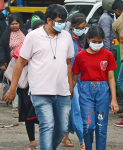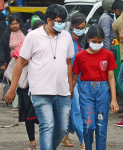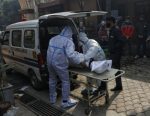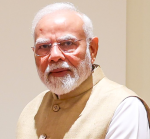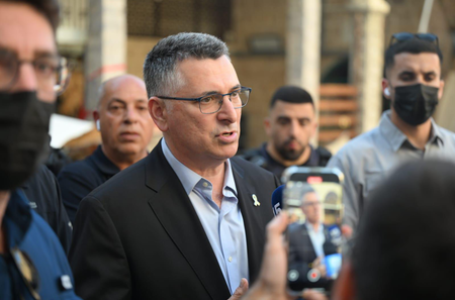
By Ranjit Devraj
March 22, 2020
New Delhi: The sight of dozens of people sitting around swigging cups of cow urine to ward off COVID-19 might be bizarre, but in India, the cow is sacred and its excretions are thought to have therapeutic value, even by some in the scientific establishment.
No less than the esteemed Indian Institute of Technology-Delhi (IIT-D) runs a full-fledged research programme called SVAROP (Scientific Validation and Research on Panchgavya), which is devoted to establishing the concoction’s supposed therapeutic benefits. Panchgavya is a mix of bovine urine, dung, milk, curd and ghee (a type of butter). SVAROP was launched in December 2016 with the participation of some 125 scientists from leading science and technology institutions and with Harsh Vardhan, minister for science and technology as chairman. The programme has attracted 50 research proposals, but has, so far, failed to turn up anything reportable.
However, the emergence of COVID-19 — of which India now has 324 cases, including five fatalities as of 22nd March — has given supporters of the concoction a convenient excuse to push its use as medicine
V.K. Vijay, professor at the Centre for Rural Development and Technology at IIT-D, tells SciDev.Net: “We are looking to provide scientific validation to panchgavya, which is already being used extensively as an ayurvedic medicine to treat various diseases.” Ayurveda, India’s ancient system of medicine, is popular and receives full patronage from the government.
But organisations like the Akhil Bharat Hindu Mahasabha (All India Hindu Union), which conducted a cow urine drinking party in the national capital on 14 March, are not waiting for any scientific validation and appear bent on promoting bovine excreta as ‘amrit’, or elixir of life.
“Gaumutra (cow urine) is the only answer to the coronavirus which is an avatar (incarnation) sent down to punish mankind for eating animals,” said Swami Chakrapani, head of the Mahasabha, as he and his followers chanted ‘corona shant ho’ (be still, corona). He promised to hold more cow urine drinking parties across the country.
Demands by rationalists to restrain Chakrapani and others from promoting dubious cures for COVID-19 infections have been ignored by the openly pro-Hindu government, which is committed to promoting Hindu beliefs and rituals.
If anything, members of the ruling Bharatiya Janata Party (BJP) have been extolling the virtues of cow urine. Suman Harpriya, a lawmaker in north-eastern Assam state, solemnly declared on 2 March in the provincial legislature that cow urine and cow dung could be used to treat COVID-19.
Chakrapani’s rituals, which consisted of waving spoonfuls of cow urine at COVID-19, depicted as a half-lion half-man beast, were enthusiastically supported by trained bodyguards provided to him by the government. Images of the event received wide publicity and circulated online and shared on social media.
Official commitment to research on cow urine and other bovine products was apparent in an advertisement released by the Department of Science and Technology (DST) on 14 February, calling for research proposals into ‘Scientific Utilisation through Research Augmentation of Prime Products from Indigenous Cows (SUTRA-PIC)’.
Backing the programme is the ministry of AYUSH — acronym for five traditional systems of medicine: ayurveda, yoga, unani, siddha and homoeopathy, and also means longevity — that was formed when the BJP came to power in 2014. On 29 January, the ministry issued an advisory suggesting that homoeopathy could prevent coronavirus infections and that unani (Greek and Arabic medicine) might provide symptomatic relief.
The DST advertisement carried an impressive list of ailments that are supposed to respond to ‘cowpathy’, including arthritis, renal disorders, gastrointestinal ailments, diarrhoea, cancer, diabetes, high blood pressure, asthma, psoriasis, eczema, ringworm, itching, cardio-vascular ailments, epilepsy and gynaecological problems.
Research proposals are expected to “undertake detailed scientific investigation of chemical profiling, identification of bioactive principle responsible for enhancing activity of antibiotics and anticancer drugs, and other medicinal properties of prime products of the indigenous cow”, the advertisement said.
There was a reference to a scientific paper published in the Asian Journal of Pharmaceutical and Cilnical Research in 2017 which claimed that cow urine had “special properties that can be used in combination with different therapeutic agents to cure several diseases such as tuberculosis, leprosy, and cancer”. But the paper cautioned that “further in vivo and clinical studies are required to confirm its therapeutic efficacy”.
The call by DST for research proposals on ‘cowpathy’ was greeted by protests from India’s scientific community, A group of 500 of them petitioned the government ahead of National Science Day on 28 February to withdraw the SUTRA-PIC programme as “unscientific” and a waste of scarce research funds.
The petition objected to the DST proposals limiting research to “Indian cow breeds, with a presumption of special physiological status to select breeds of only one species. Nowhere in this document or other scientific literature we find any scientific basis for this presumption. Thus, it seems the purpose of this scheme is to pour in money to aid confirmation bias of the proponents of this scheme”.
“We regret to note that such a flawed document issued by the DST along with several other bodies of the government of India will severely undermine the credibility of the Indian scientific establishment,” the petition, signed by scientists drawn from across the country, said.
Aniket Prakash Sule, a physicist and science educator with the Tata Institute of Fundamental Research, who helped draft and organise the mass petition, tells SciDev.Net that it is particularly regrettable that doubtful research on cow dung and urine is being funded by the DST at a time when funds are not available for serious research.
“Regrettably, unscientific claims made by public figures are finding support from university vice-chancellors keen to be in the good books of the powerful political class, and now we have respectable scientific bodies like the DST following suit,” said Sule. “This does not bode well for the future of science policy and research.”
According to Sule, support by the DST for doubtful research proposals based on religious texts becomes dangerous when a fearful and undiscerning public sees it as validation of cow dung and urine as cures for COVID-19 infections. “More so when no vaccine or medicine against the virus is likely to be available in the near future”.
To its credit, the government is not waiting to find out about the value of cow urine in treating COVID-19 cases but heeding to the opinion of Balram Bhargava, director-general of the Indian Council of Medical Research (ICMR), the country’s apex biomedical research outfit, that since no vaccine can be developed inside of a year extensive testing and lockdowns are the best response.
In a media briefing Tuesday (17 March), Bhargava said that the ICMR already has at its disposal 121 government laboratories and is talking to 51 top class private laboratories to provide free testing for COVID-19. “We are now in stage two [local transmission] and have not reached stage three [community transmission],” he said.
India, a country of 1.3 billion people, has also been put under a near total lockdown with schools and colleges closed and public gatherings prohibited. A ban on travel into India of passengers from Afghanistan, Malaysia and the Philippines, imposed on Tuesday, was extended to the EU, Turkey and UK on Wednesday. The ban is effective until 31 March.
(Courtesy SciDev.Net)





